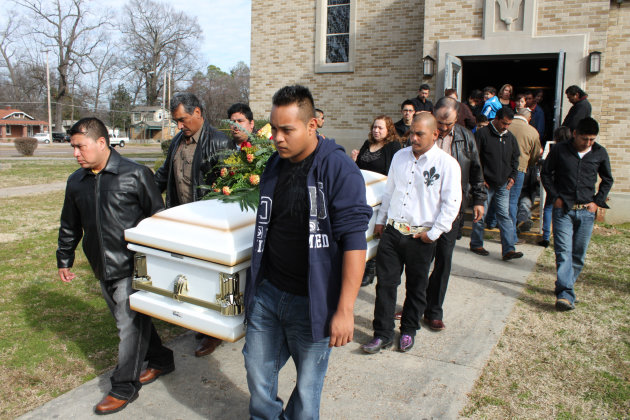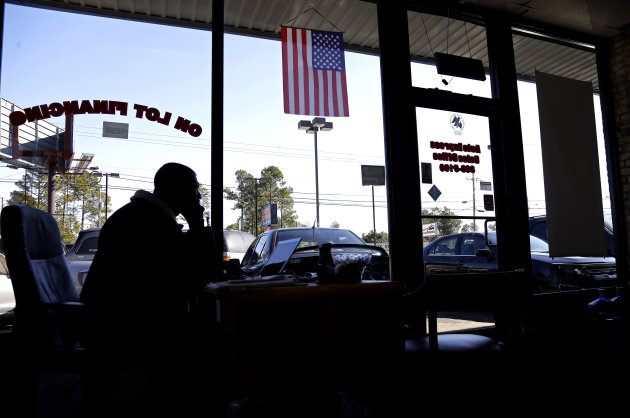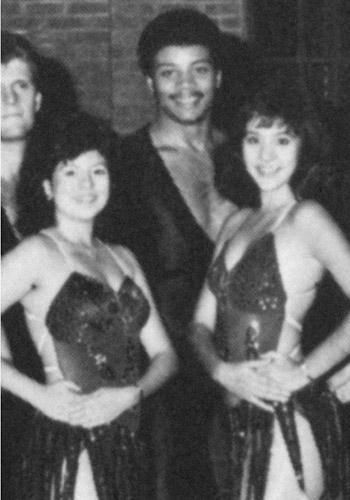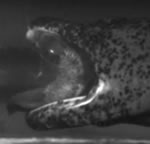It was just past 1 a.m. when they found Christopher
Cotton's body, slumped in the driver's seat at a Buffalo, N.Y.,
intersection, shot dead by an assailant who left all the car's windows
up, the doors locked. Little more than an hour earlier, the
pharmaceutical technician had joined family for drinks and YouTube
videos, then went to meet his girlfriend. He never made it.
The killing of the 42-year-old father of three was the industrial
city's first murder of the year. But for a country that would not wake
for hours, the slaying was merely the first of another deadly day, the
latest addition to an endless count of Americans who are killed with
guns.
The school massacre in Newtown, Conn., on Dec. 14 was a horrific
anomaly. Most fatal shootings claim only a single life and draw only the
briefest attention.
From the biggest cities to the smallest towns, more than 31,000
people die of gunshot wounds in the U.S. each year, according to the
Centers for Disease Control and Prevention. That's an average of nearly
87 a day. About 30 of those are murdered. More than 50 take their own
lives. Still others die in accidental shootings, during police
intervention or from other causes.
We chronicled one such ordinary day —
Jan. 19. There is no way of knowing exactly how many shooting deaths
there were on that Saturday. But just one shooting made national news: A
former pastor, his wife and three children were slain at their home
near Albuquerque, N.M. The couple's 15-year-old son, Nehemiah Griego,
was charged with their murders.
Most, though, will recall the day as the start of the Martin Luther
King Jr. holiday weekend, capped by the presidential inauguration, each
prompting reflection on how to quell violence. But in a nation whose
citizens own more than 300 million guns, such events do not disrupt the
metronomic toll of shootings.
And in that way, Jan. 19 was just another day.
___
By 2:41 a.m. slumber cloaked most of the homes on tree-lined Deer
Trace Drive in the Atlanta suburb of McDonough, Ga. But inside one
house, three boys stirred. A pair of brothers — 14 and 15 — were hosting
a friend for a sleepover. Earlier in the evening, their mother had
given them permission to examine her empty .38-caliber revolver, police
said. But sometime over the next few hours, the boys loaded the weapon,
then put it aside and apparently forgot.
It's not clear what prompted the younger boy to pick up the gun
again. But when he pointed it at his brother and pulled the trigger, the
bullet hit the Union High School sophomore in the chest. Emergency
workers were unable to save him.
Investigators have determined the shooting was accidental. But the
14-year-old has been charged with involuntary manslaughter and
investigators may present his mother's case to a grand jury.
The boy would not be the only victim of an accidental shooting on
this day: Within hours, Jeffrey Dennehy, 23, died in Gresham. Ore., when
a gun held by a close friend mistakenly discharged.
___
At 1:04 a.m., Anthony Burns, 31, was shot dead on an east Cleveland street. Four people have been charged with his murder.
___
The White Castle on St. Louis' north side was bathed in light, even at 3:50 a.m., when Thomas Donovan
stepped to the burger joint's counter and drew a pistol. Back in
November, with a security camera rolling, a masked man wielding a
shotgun held up the same restaurant before fleeing into the darkness.
Police say that man was Donovan, 21, who lived nearby. This time,
though, two off-duty police officers hired by the manager were waiting.
The officers, who were in uniform, ordered Donovan to drop the gun.
"Why, at that last moment they said 'Freeze!' he carried on, that's
what gets me, you know what I mean?" says George Fields, among a group
of older men who gather at the restaurant for coffee.
When Donovan refused, one officer, a 21-year veteran, shot him in the
abdomen. An ambulance rushed Donovan to a hospital, where he was
pronounced dead. Donovan's pistol turned out to be a BB gun. The
officer, who a police spokesman would not identify, was placed on
administrative leave for three days, but is back on the job without
being charged.
"Everybody's got a gun. Just because he's a dummy doesn't mean you
have to kill him," says Fields, who wonders what might have changed both
Donovan's decision and the policewoman's. "You can't stop it from
happening again, but maybe you could slow it down."
___
In Hampton, Va., Joseph McQueen, 30, and Clifton Christian, 24, were shot and killed outside a bar about 1:45 a.m.
In Allentown, Pa., Kyle Stroman, 20, was shot dead at an intersection at about 2 a.m.
Around 2:30 a.m., Tracy McFadden, 44, was shot dead on Georgia Avenue in Washington, D.C.
___
Late in the morning, shots rang out near the small East Texas town of Winnsboro, killing 37-year-old Juvenal Gonzales.
A self-employed painter, Gonzales was separated from the mother of
his four children and had come to her home to pick them up for
visitation. An argument ensued, and Gonzales was shot by a man at the
house, the Franklin County sheriff's office said.
For some people in neighboring Hopkins County, the news was jolting. The man charged with Gonzales' killing — Clint Weldon Wilson, 31 — had killed before; claiming self-defense he eventually went free.
"The victim's family in this new
case — I can't possibly imagine how difficult it would be for them to
know that someone had done this before," said Martin Braddy, the
prosecutor in the earlier case, in which Wilson was charged with
murdering Justin Pawlik, 27, during a 2011 struggle. At the scene was a woman who'd broken up with Pawlik and befriended Wilson.
But Texas' stand-your-ground law allows deadly force in some
circumstances when a person feels threatened, and a grand jury declined
to indict Wilson.
Pawlik's mother, Julie Bailey, said she had feared Wilson would cause more harm.
"Now another guy is dead," she said. "If they don't get rid of that law, they better start getting ready to dig more graves."
___
In Greensboro, N.C., Matthew Obrian Norris, 28, was shot multiple
times after attacking a friend who'd asked him to leave. The 3:28 a.m.
shooting was ruled a justifiable homicide.
At the University of Idaho, Jason David Monson, an 18-year-old
freshman and talented horseman who won trophies for cowboy mounted
shooting, fatally shot himself in his dorm room.
___
Around 12:20 p.m., gunshots erupted at the Bay Area Rapid Transit station in San Leandro, Calif. Ken Seets was waiting there for a bus, heading home after work.
One bullet struck the 50-year-old Seets in the chest, and he died
within minutes in the arms of a bus driver who tried to aid him. Police
said it was crossfire between members of rival gangs, and they are
seeking an 18-year-old suspect.
Seets, who didn't own a car, delivered dry cleaning supplies for
nearly 20 years. "I never saw him mad," said his boss and good friend,
Cynthia Perez.
Raised on a farm in Georgia, Seets joined the Army after high school,
met his longtime girlfriend, Doleen Stevenson, after she divorced
another soldier, and followed her to the Bay Area. She said he was a
loving surrogate father to her daughter.
He also forged a close relationship with Tammy Scott and her son,
Malcolm, coaching him in sports, urging him to work hard at school.
"When Ken first came to California, he was a stranger," Scott said.
"At his memorial service, there was a line out the door... Once he found
you, you had a friend to the end."
___
Around 1:40 p.m., Leslie Stubblefield, 43, was found dead of a gunshot wound in Kansas City, Kan.
In California's Humboldt County, the body of Jacob Allen Green, 24,
of Newport, Ore., was found in his vehicle. Police say Green shot
himself a day after killing a 16-year-old girl, Kayla Ann Hendrickson,
near Tillamook, Ore.
___
Back for the afternoon at Cleveland's UH Rainbow Babies &
Children's Hospital, Dr. Anthony DeRoss hurried to prepare for a
scheduled appendectomy when the pager on his belt flashed an alert:
Level 1 trauma patient en route.
The patient was a 6-year-old cherub with pigtails named Nevaeh Benson.
At 1:13 p.m. she'd been at home on East 116th Street when her father
sent her to fetch something for an infant sister. Family members heard a
thump, and Edmund Benson ran upstairs to find Nevaeh sprawled across
the bedroom floor with his handgun. Police said she found it where her
father hid it and accidentally shot herself in the face.
By law, Edmund Benson, 23, was not supposed to have a gun. He has a
felony record and has been charged with having a weapon under disability
and endangering a child.
At the hospital, though, DeRoss' team knew only that they had a
gunshot victim in dire condition — and that the death rate from such
injuries is much higher than other types of trauma.
"I always think about what we could've done to prevent it...that's
where my mind always travels to, how can we keep this from happening
again," DeRoss says. "And there's not always an easy answer."
If only doctors could turn back the clock and show parents the risks,
he says. If only they could save children like Nevaeh. Days later, her
photo smiled alongside a newspaper notice that made no mention of how
she died. "Summoned by angels," it said.
___
In Mulberry, Ill., Charles Chrisman, 40, fatally shot himself in his home and was found about 2:43 p.m.
At about 4:15 p.m., Jermaine Foster, 30, was found shot dead inside a car in Fort Wayne, Ind.
___
Kristy Aschliman
made a point to keep in touch with family, sometimes calling twice a
day to talk about music or work. But recently, there was also talk of
trouble. Four times in the past few months, Aschliman's apartment in
Idaho Falls, Idaho, had been burglarized. The 21-year-old bought a small
pink-and-white pistol for protection, but it was stolen, too, according
to her grandmother, Estelle Nation.
Just before 1 p.m., Aschliman's car swerved into the snow along
semi-rural Lincoln Road, and she ran. A man with a gun gave chase,
fired, and four bullets struck Aschliman in the head, police said. She
died there.
After setting up roadblocks, Sheriff's officers arrested Adan Arroyo,
22, and charged him with murder. Investigators will not comment on his
motive or relationship to Aschliman. Arroyo has a lengthy court record
for vandalism, theft and other charges. At the time of her death,
Aschliman was facing drug possession charges.
At a memorial service, relatives and friends filed past an open
casket; they recalled Aschliman's work with disabled children, and the
time she lavished styling her hair and fingernails. But there is little
peace for a family that has long celebrated the April birthday Aschliman
shared with her father and her closest aunt.
"It's going to be hell," her grandmother said.
___
In Long Beach, Calif., three men and a woman entered a mobile home at 4:30 p.m. and opened fire, killing Jose Luis Vidal, 24.
In San Francisco's Alamo Square neighborhood, Jamal Gaines, 26, died after being hit by multiple gunshots at 5:30.
___
Rene Trejo worked hard as a bricklayer in Memphis, and loved soccer
so much that he played on three different teams. But his sister-in-law
says his plan was to move back to his homeland of Mexico, where he'd
been sending money to help his impoverished mother open a restaurant.
The homecoming took place — but not as the family could have
imagined. Trejo, 28, was killed in a nighttime robbery attempt on Jan.
19. His remains were sent back to San Luis Potosi for a funeral Mass and
burial.
According to police, Trejo was in his car with two friends outside a
Z-Market convenience store when three men approached and demanded money.
One fired a shot that fatally wounded Trejo; no arrests have been
reported.
Trejo, who was unmarried, came to the United States 10 years ago,
followed two years later by his younger brother, Oscar, a roofer.
Oscar's wife, Dora, said Rene was in the U.S. illegally, but added:
"What he came here to do was to better his family and help out his
mother."
___
In Rosewood, Fla., John Freddrick Alford, 63, died after being hit by
buckshot fired by a youth with whom he was hunting wild hogs.
At about 10 p.m., the body of Hurbert Dewayne Jackson, 27, was found
on a roadside in Little Rock, Ark., the victim of a shooting.
In Greenville, S.C., Edward Goldsmith, 47, was shot dead in an apartment complex parking lot.
___
The obituary for Kristi Suckla, as posted by a Dallas-area funeral home, is strikingly brief.
"Kristi was born on December 5, 1968, and passed away on Saturday, January 19, 2013. Kristi was a resident of Grapevine, Texas."
An accompanying video tribute, though wordless, conveyed much more —
photographs of Suckla savoring vacations at the beach and in the
mountains, grinning with her two children, and posing with her husband,
Kelly.
There was no hint of the tragedy that unfolded that Saturday night at
the Sweet 16 birthday party for the Sucklas' daughter, Rachel.
Though the couple was estranged, and Kristi was living at her
parents' house with her children, Kelly Suckla had been expected to
attend the party, according to police.
For reasons not yet publicly disclosed, an argument broke out around
10 p.m. Police say Kelly Suckla fatally shot Kristi with a handgun, then
killed himself.
The obituary for Kelly Suckla, 43, described him as a devoted father,
but made no mention of Kristi. "Everyone who knew Kelly knew of his
love for his family and his friends," it said.
___
Around 9:45 p.m., in California's Tulare County, Osevio Lopez, 34,
was found by highway patrol officers in the driver's seat of a vehicle,
fatally wounded by a shot to the head.
In the El Sereno community of Los Angeles, Angel Serna Mancilla, 27
was fatally wounded by gunfire during an argument at a taco truck.
In Picayune, Miss., Nickoles Ray Sullivan, 33, was shot dead outside his home. His live-in girlfriend was charged with murder.
___
By all accounts, David Braswell shared a fierce relationship with Tamara Smith, his longtime girlfriend and mother of four of his children.
Police in Thomasville, N.C., say Braswell was arrested in 2005 for
assaulting Smith. Braswell's mother recalls the time she saw Smith
chasing her 280-pound son down the street, swinging at him and swearing.
"They argued for the last 14 years," Nona Lee Braswell says. "It was a rocky relationship, but they loved each other."
That may be so, but when Smith's father, Clifton Gregory Dennis,
heard screams inside the house he shared with the couple just after
10:30 p.m., he grabbed a .22-caliber rifle. In the hall, Dennis
confronted the 38-year-old Braswell, who police say had his hands around
Smith's throat. Dennis fired two shots. The first struck the wall near
the ceiling. The second hit Braswell in the chest as the children
watched.
Dennis, 56, is barred from owning a gun because of a felony record
dating to 1987. When he faced drug charges in 2004, he was also
convicted of possession of a firearm by a felon. Braswell's death
brought another wrongful gun possession charge and Dennis pleaded guilty
March 7 and was sentenced to 15 to 27 months, requiring six months in
prison and three years' probation. But investigators determined the
killing was justified as self-defense or the defense of others.
That decision angers Braswell's family, but they're trying to focus on caring for his sons and daughters.
"God love little children who have to go through stuff like that," said Braswell's aunt, Zondra Ayers.
____
Around 11:40 p.m., 20-year-old Ruben Gonzalez Jr. was shot dead in
Santa Ana, Calif., in what police said may have been a gang-related
incident.
In Fort Washington, Md., 16-year-old Marcus Jones was fatally shot as
he left a birthday party that drew members of rival youth gangs, Baby
Haiti and Danger Boys. Two teenage suspects were arrested, said Prince
George's County police.
The call came in around midnight.






 If
you're going to try to return that printer to the store, you should
remove those copies of $100 bills from it. Police in Lake Hallie,
Wisconsin, arrested Jarad S. Carr on charges of attempted theft by
fraud, forgery, and resisting arrest.
If
you're going to try to return that printer to the store, you should
remove those copies of $100 bills from it. Police in Lake Hallie,
Wisconsin, arrested Jarad S. Carr on charges of attempted theft by
fraud, forgery, and resisting arrest.



 People embrace by the ancient stone circle of Stonehenge, in southern
England, as access to the site is given to druids, New Age followers
and members of the public on the annual Winter Solstice.
People embrace by the ancient stone circle of Stonehenge, in southern
England, as access to the site is given to druids, New Age followers
and members of the public on the annual Winter Solstice.


 The
giant salamander (Andrias davidianus) doesn't just eat its prey
... it sucks it whole down its mouth in amazing speed:
The
giant salamander (Andrias davidianus) doesn't just eat its prey
... it sucks it whole down its mouth in amazing speed: